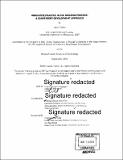Innovative practice in the building process : a convergent development approach
Author(s)
Fisher, Jason (Jason Dean)
DownloadFull printable version (14.22Mb)
Other Contributors
Massachusetts Institute of Technology. Center for Real Estate. Program in Real Estate Development.
Advisor
Dennis Frenchman.
Terms of use
Metadata
Show full item recordAbstract
The current practice of building is a slow-moving, fragmented, and conflicted industry that operates on a variety of scales, emotions, professions and realities. The current practice of making buildings has the potential for innovation to align interests among otherwise adverse parties. Buildings are complex and dynamic physical realities, operating as economic, social, and emotional constructs in the urban environment. Buildings also constitute the single unifying element upon which all stakeholders in the process place their expectations. Financial, spatial, emotional, and civic success hangs in the balance of a zero-sum process. The background of the development process is presented, focusing on the current practices of real estate development and architecture and highlighting the critical relationship between each entity. Following the description of the underlying relationships and processes, three case studies of actual practices are presented as innovative and unique alternatives to the current process of building. Each case study outlines a potential integration and convergence of real estate development and architectural design, providing a new viewpoint from which to analyze current practice. Five principles of excellent development emerge from the case studies as decisive benchmarks to analyze the building process. Following initial background information and explicit understanding of current processes and potential innovative alternatives, this thesis proposes a new practice model of integrated real estate development and architectural design, the Convergent Model, which seeks to simplify the building process and align economic, social, and cultural goals within a truly interdisciplinary team of professionals. The process is a potential solution to the compounded and interconnected issues of current practice and is more likely to meet the five principles of excellent development. Finally, the Convergent Model is put into practice through a hypothetical demonstration project. The demonstration project consists of a comparison between a Baseline and a Proposal, two developments on the same site. The Baseline utilizes traditional practices and the Proposal employs the Convergent Model. The development processes are compared side by side and evaluated as an illustrative depiction of the potential for a new development process that is more capable of creating excellent buildings.
Description
Thesis: S.M. in Real Estate Development, Massachusetts Institute of Technology, Program in Real Estate Development in conjunction with the Center for Real Estate, 2016. Cataloged from PDF version of thesis. Includes bibliographical references (pages 60-61).
Date issued
2016Department
Massachusetts Institute of Technology. Center for Real Estate. Program in Real Estate Development.; Massachusetts Institute of Technology. Center for Real EstatePublisher
Massachusetts Institute of Technology
Keywords
Center for Real Estate. Program in Real Estate Development.